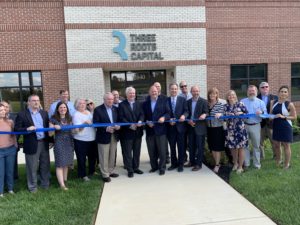
Knoxville News Sentinel Opinion article written by Bill Malkes, a co-founder and former CEO of GRIDSMART Technologies, Inc.
To read article click on this link

Knoxville News Sentinel Opinion article written by Bill Malkes, a co-founder and former CEO of GRIDSMART Technologies, Inc.
To read article click on this link

2019 was an eventful year for Three Roots Capital.
The company forged valued partnerships, tackled new projects, and originated $24 million of new loans. These loans ranged in size from $25,000 to $7.6 million with an average loan size of $2.7 million. At the close of the year, Three Roots had approximately $40 million of funded loans in its loan portfolio.
Three Roots deployed capital in a diverse range of industries throughout the state, including a financial technology (“fintech”) company in Knoxville and an internet-based retail business in Chattanooga. Additionally, Three Roots provided new financing for commercial and retail real estate developments in Knoxville and Johnson City and a mixed-use real estate development in Cookeville. In Knoxville, Three Roots financed a multi-family, residential real estate project in the South Waterfront district.
One of the most significant deals of 2019 was the Model Mill project in Johnson City, which will open sometime in 2020. Three Roots provided bridge financing for the high-profile, high-impact project and then participated as the leverage lender in a New Markets Tax Credit (NMTC) financing for the project. Three Roots provided capital and advisory services for the $19.5 million project, ultimately funding $10.6 million of the total amount. Recently, Three Roots submitted its second NMTC application, as the company continues to pursue additional sources of capital for companies and projects in the region.

Earlier this year, Three Roots was proud to help launch the TennesSeed Fund, an evergreen, seed-stage, proof of concept venture capital fund dedicated to investing in companies throughout Tennessee. The Fund is managed by TennesSeed Partners, which is a collaboration of Three Roots, Meritus Capital, and Innova Memphis. Grady Vanderhoofven, the founder, president and chief executive officer of Three Roots, serves as the Fund’s co-manager and as an investment committee member. The fund has already made three regional investments to date.
Additionally, Three Roots Capital held an open house and ribbon cutting at its new headquarters in May 2019.
Looking at 2020, Three Roots is enthusiastic to continue working with valued partners and to help new projects come to fruition, such as the Brushy Mountain State Penitentiary transformation into a tourist attraction and event venue. After making two loans to finance the Brushy Mountain transformation in 2018, the Three Roots team helped the project mature and transition to bankability in 2019. Three Roots hopes to help Brushy Mountain in its expansion efforts this year.
Throughout 2019, Three Roots provided advisory and technical assistance to dozens of companies and projects in the state, which included working with a number of individuals and organizations interested in Opportunity Zones. In 2020, Three Roots is looking forward to assisting these companies and projects as they engage in activities in Opportunity Zones and pursue Opportunity Funds in Knoxville, Oak Ridge, and the surrounding region.

Three Roots Capital Spotlight: Dr. Marianne Wanamaker, Board Member
Three Roots Capital is pleased to announce that Dr. Marianne Wanamaker has joined the board of directors. Wanamaker is an associate professor of Economics at the University of Tennessee (UTK), a research associate at the National Bureau of Economic Research, and a research fellow at the Institute of Labor Economics (IZA).
She is a member of the Federal Workforce Policy Advisory Board and previously served as the former chief domestic economist at the White House Council of Economic Advisors, where she also served as the senior labor economist. Among her numerous professional accomplishments, Wanamaker is a recipient of the 2019 Kenneth J. Arrow Award, serves as co-editor of Explorations in Economic History, and has received several college and university-level teaching awards, including UT’s Alexander Prize in 2019.
Wanamaker’s research interests include labor economics and workforce development, education, American economic history, and demography, making her an excellent addition to the board. Speaking about her appointment, Wanamaker expressed that she’s “thrilled about the opportunity” and looking forward to learning from her fellow board members’ experiences.
“It will be fun to bring the perspective of someone who has recently been in Washington D.C., thinks about labor markets all day long, and has a totally different perspective on economic development than they do,” she added. “I believe our expertise and experience will complement each other very well.”
Wanamaker met both Chris Miller, chief financial officer, and Grady Vanderhoofven, president, chief executive officer, and board member, at university-sponsored events several years ago. They remained in touch due to their “shared interest in economic policy and the big picture.”
“The work Three Roots does is incredibly important,” Wanamaker shared. Three Roots’ mission to promote economic development in the region addresses an important gap in development economics research because plenty of “money, time, and effort” in the economics profession today is dedicated to international contexts, rather than “development within U.S. borders,” she said.
“Economists have documented that people in developing countries can improve their standard of living with access to capital. Once you’ve given them capital, economists have also shown that borrowers need coaching and support,” she continued. “International research is good, but it has surprised me — as I am from rural west Tennessee — that a lot of these stories are also true in the U.S. and seem to be completely ignored by the economics profession. We just don’t do research on what works in Appalachia.”
Wanamaker said her time working in Washington D.C. taught her that the federal government understands that access to capital is a real issue for many areas of the country but needs economists to pay attention to “what works and what doesn’t.” She said she is excited to be “on the ground” and have a “firsthand view” of what is going on in the economic development sector through the lens of Three Roots.
Two of Wanamaker’s favorite aspects of her work are the people she encounters and the stories she tells in her research. She expressed that this appointment both fulfills her desire to build more connections and share her expertise with her community.
“A big part of the mission of the University of Tennessee is to be engaged in our community and to take the expertise we use every day and spread it and share it with the people and groups outside of campus,” Wanamaker explained. “I can’t think of a better way to do that than to be on this board. Three Roots is doing so much good. It really is a perfect match.”

Forging valued partnership, connecting a vibrant city, and restoring a historic structure: Model Mill
Three Roots Capital values its partnerships with skilled developers and financial institutions who support its mission to promote sustainable, meaningful economic development in Eastern Tennessee communities.
This commitment to forging high-quality relationships led Three Roots to connect with Grant Summers, president of Summers-Taylor, Inc., who was seeking financing for the Model Mill project in downtown Johnson City.
Three Roots’ Chief Financial Officer Chris Miller explained how Three Roots was drawn to the Model Mill project because of the Summers family’s commitment to creating value in their community through undertaking such a large-scale, challenging, historic renovation. Due to higher-than-average construction expenses, in addition to other challenges and limitations, Three Roots’ connections, expertise, and access to capital were the right fit for the project’s needs.
Originally built in 1908, the Model Mill operated as a flour mill for nearly 100 years before the property was abandoned in 2003. Over the next few years, many developers and community groups attempted to develop the property without success. By 2014, the Tennessee Preservation Trust had listed the building on its top-10 endangered properties list after it had fallen into disrepair, serving as a barrier to connecting the thriving development efforts in downtown Johnson City and East Tennessee  State University’s (ETSU) campus. This problem was further exacerbated when an arsonist set fire to the property in early 2016.
State University’s (ETSU) campus. This problem was further exacerbated when an arsonist set fire to the property in early 2016.

Summers-Taylor, Inc. purchased the property in late 2016, with plans to restore the building and property and transform it into a commercial, mixed-use facility. The facility will provide space for the headquarters of Summers-Taylor, Inc., the Johnson City Chamber of Commerce, ETSU’s program offices, and possibly additional tenants.
The project is located in a severely distressed census tract in Johnson City, with a poverty rate of 39.4 percent. It is expected to create or retain 164 permanent jobs in the area. The goal of the project aligns with the economic development strategy for the city, the local development district, and the Appalachian Regional Commission. In addition to providing direct financing for the project, Three Roots encouraged Summers-Taylor, Inc. to pursue New Markets Tax Credits (NMTCs) as a financing mechanism, introducing them to BrightBridge, which is an organization based in Chattanooga, Tennessee, that specializes in NMTC financing transactions.
“This project really makes a difference in the community for several reasons, including the high-quality jobs it’s going to create and locate in that area, the fact that we’re preserving a historic structure, and the way this project connects the university and downtown regions of Johnson City,” said Miller.
In addition to making multiple direct loans to the project over time, Three Roots worked with BrightBridge to secure additional capital for the project from several, well-respected financial institutions: First Horizon (previously known as First Tennessee), US Bank, Royal Bank of Canada, Citizens Bank, and People Incorporated Financial Services of Virginia. Total financing for the project amounts to $19.5 million, and Three Roots provided $10.6 million of the total financing.
“We want to work with the most capable, high-quality entrepreneurs, developers, companies, and financial institutions in our region,” said Miller. “The Model Mill project was another opportunity for us to do just that.”
Model Mill will be complete sometime in 2020.